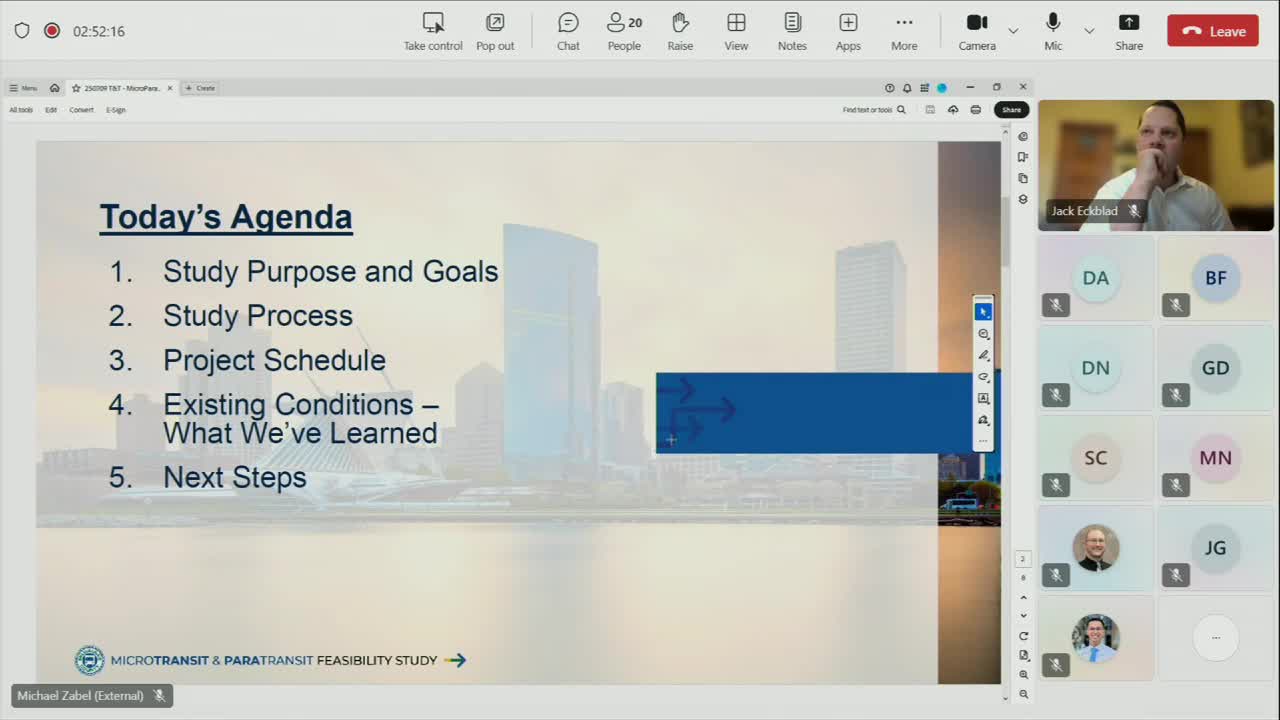Milwaukee County explores sustainable paratransit options with HNTB study
July 09, 2025 | Milwaukee County, Wisconsin
This article was created by AI summarizing key points discussed. AI makes mistakes, so for full details and context, please refer to the video of the full meeting. Please report any errors so we can fix them. Report an error »

On July 9, 2025, the Milwaukee County Committee on Transportation and Transit convened for a hybrid meeting to discuss the future of the county's transit system, focusing on fiscal sustainability and service improvements. The meeting highlighted ongoing efforts to evaluate and enhance the Milwaukee County Transit System (MCTS) through a comprehensive study conducted by HNTB, a consulting firm engaged to explore new transit solutions.
The primary goal of the study is to assess current transit conditions and forecast future needs, particularly in the paratransit sector. Sandy, a committee member, emphasized the importance of investigating various options to create a more sustainable transit model. The study aims to provide a detailed report by early August, which will outline potential service models and their associated costs, allowing the committee to make informed decisions moving forward.
Mike Zabel from HNTB presented an overview of the study's three components: an existing conditions report, a market analysis, and a comparison with peer transit systems across the country. He noted that ridership for paratransit services is rebounding to pre-pandemic levels, with 90% of trips being completed on time. This positive trend indicates a strong demand for transit services, particularly for same-day options that have shown increased interest among riders.
The committee also discussed the financial aspects of the transit system, with Supervisor Balinski highlighting that Milwaukee's cost per passenger is comparable to other peer cities, suggesting that the county is managing its transit budget effectively. However, concerns were raised about unbudgeted overages amounting to $3.4 million, prompting questions about potential recourse within the transit contract to address these financial discrepancies.
As the study progresses, the committee will continue to evaluate existing services and explore innovative transit solutions to meet the evolving needs of Milwaukee County residents. The anticipated report will serve as a foundation for future discussions and decisions regarding the implementation of new transit strategies, ensuring that the county's transit system remains responsive and sustainable in the years to come.
The primary goal of the study is to assess current transit conditions and forecast future needs, particularly in the paratransit sector. Sandy, a committee member, emphasized the importance of investigating various options to create a more sustainable transit model. The study aims to provide a detailed report by early August, which will outline potential service models and their associated costs, allowing the committee to make informed decisions moving forward.
Mike Zabel from HNTB presented an overview of the study's three components: an existing conditions report, a market analysis, and a comparison with peer transit systems across the country. He noted that ridership for paratransit services is rebounding to pre-pandemic levels, with 90% of trips being completed on time. This positive trend indicates a strong demand for transit services, particularly for same-day options that have shown increased interest among riders.
The committee also discussed the financial aspects of the transit system, with Supervisor Balinski highlighting that Milwaukee's cost per passenger is comparable to other peer cities, suggesting that the county is managing its transit budget effectively. However, concerns were raised about unbudgeted overages amounting to $3.4 million, prompting questions about potential recourse within the transit contract to address these financial discrepancies.
As the study progresses, the committee will continue to evaluate existing services and explore innovative transit solutions to meet the evolving needs of Milwaukee County residents. The anticipated report will serve as a foundation for future discussions and decisions regarding the implementation of new transit strategies, ensuring that the county's transit system remains responsive and sustainable in the years to come.
View full meeting
This article is based on a recent meeting—watch the full video and explore the complete transcript for deeper insights into the discussion.
View full meeting
